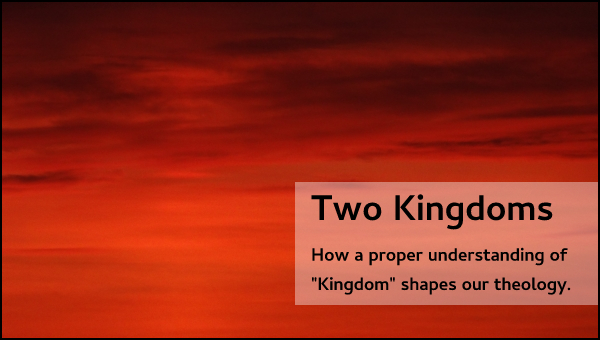By Tyson Thorne

Last week we learned that there is more than one kingdom that Jesus talks about in the Gospels. Matthew discusses the Kingdom of Heaven, different from the Kingdom of God used by other gospel writers. The Kingdom of Heaven has traitors in its midst, while the Kingdom of God exists after the wheat and the chaff have been separated. How does this understanding of the two Kingdoms impact our theology? It has to do with a phrase that you may have come across in other readings, “now, and not yet” talking about the duality of the Kingdom.
If we speak of the Kingdom, singular, there is much confusion about its presence and revelation. When we understand that there in fact many kingdoms, the pieces tend to fall into place. Jesus brought us the Kingdom of Heaven, it exists now and has come in limited power for the advancement of the gospel message. The Kingdom of God, on the other hand, is not yet. Clarity usually comes with understanding, and hopefully this doesn’t muddy the waters but there are still more kingdoms.
Creation itself is a kingdom that God rules over sovereignly. Satan has a kingdom that God permits him to rule within. There is the Kingdom of man, politics if you will, whereby we try to fulfill our mandate to exert our God-given authority (From Genesis chapter 1) in our fallen state. There may be other kingdoms besides these, still waiting for us to discover. What is important to remember is that, most of the time (with the exception of Matthew) when the New Testament authors use the word “kingdom” it is in reference to the Kingdom of God, which is still to come.
There are a few exceptions, or course, which is why you need to know how to differentiate between the two primary kingdoms. When reading the Bible we cannot assume we always know the precise meaning of the words being used. We need to stay alert and ask questions. The Bible is intended to communicate God’s truth and it can, if we pay careful attention.
There are two prevailing theologies surrounding the Kingdom, based largely on a misunderstanding that there is but one kingdom. There is the premillennial and amillennial positions of the kingdom. The predominant position in the eastern church and some western denominations is the amillennial belief that “the kingdom” refers to the church age and that it will be completed before the second coming of the Messiah. The most popular belief in western evangelical Christianity is the premillennial position, which states that “the kingdom” refers to a thousand-year reign of Jesus leading up to the Great White Throne judgment and the ushering in of the eternal new world.
For centuries these two positions have been hotly debated, unnecessarily as it turns out. With the knowledge that there are in fact two distinct kingdoms we can make sense out of the passages of Scripture used to prove each position.
|
|
